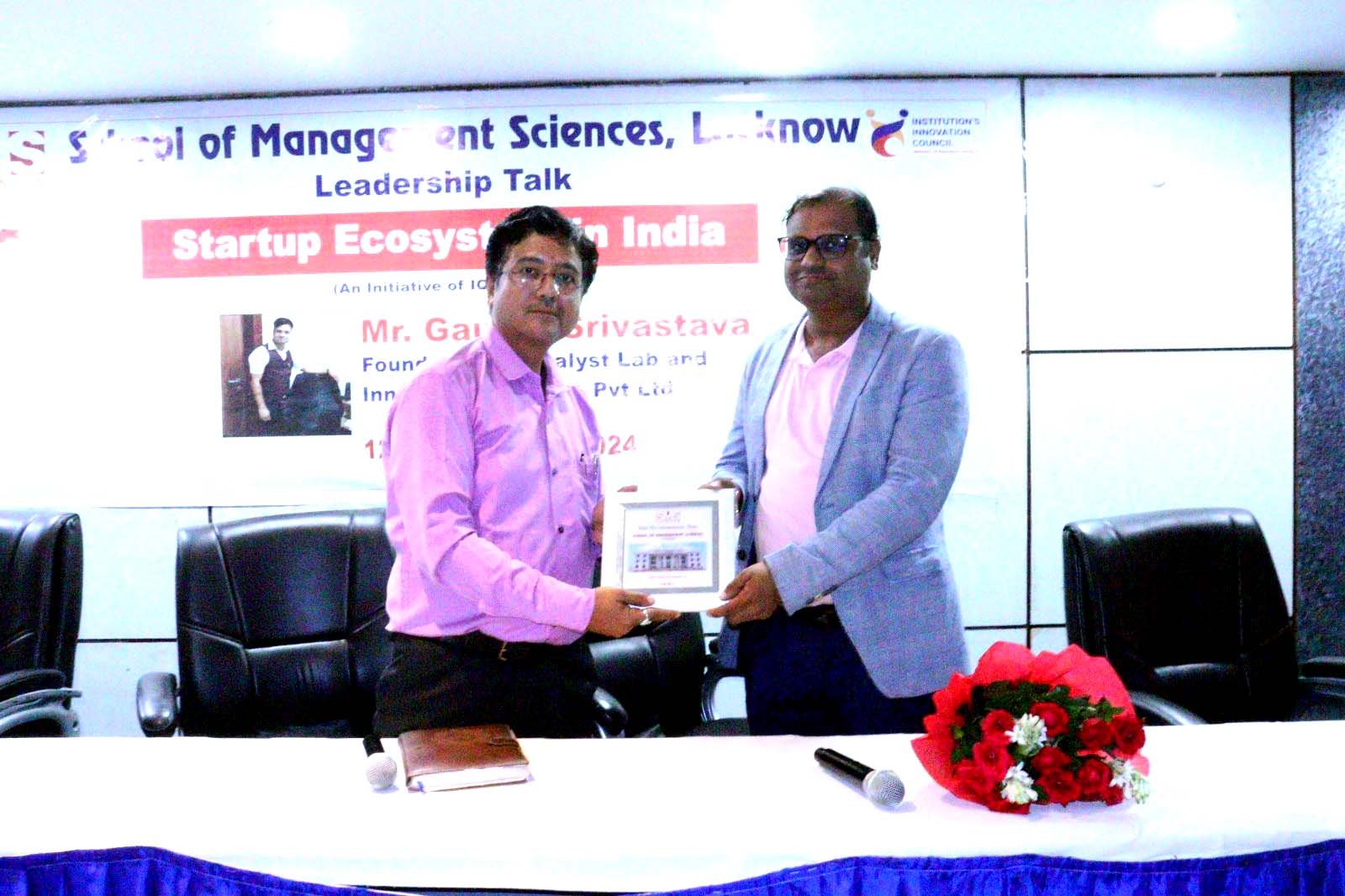Lucknow: The School of Management Sciences in Lucknow hosted a seminar on “Startup Ecosystem in India,” presented by Gaurav Srivastava, founder of The Catalyst Lab and InnerSoul Wellbeing Pvt Ltd. The seminar focused on key distinctions between startups and traditional businesses, and outlined crucial steps for launching a startup.
Gaurav Srivastava shared valuable insights into various funding sources, including:
– Angel investors
– Crowdfunding
– Banks
– Government startup schemes and other initiatives
The seminar offered students a clearer vision for their future startup ideas. Dr. Ashok Sengupta and Dr. Surendra Srivastava, who organized the event, emphasized its role in fostering students’ overall growth.

The startup ecosystem in Uttar Pradesh (UP) has undergone a significant transformation in recent years, driven by government initiatives, growing investor interest, and the rising entrepreneurial spirit among the youth. Here are some key aspects of this changing landscape:
1. Government Initiatives and Support
- Startup Policy 2020: UP introduced its Startup Policy 2020 to create a conducive environment for startups, offering incentives like seed funding, incubation support, and tax exemptions.
- Infrastructure Development: The establishment of IT parks, incubation centers, and co-working spaces across cities like Lucknow, Noida, and Kanpur has fostered an ecosystem that supports innovation.
- Ease of Doing Business: Efforts to streamline business registration, reduce bureaucratic hurdles, and provide single-window clearances have made it easier for startups to establish and operate in the state.
2. Emergence of Tier-II and Tier-III Cities
- Beyond the Metros: While Noida and Lucknow remain the major hubs, cities like Kanpur, Varanasi, and Agra are witnessing a surge in startup activity. These cities offer lower operational costs and a burgeoning market, attracting entrepreneurs.
- Focus on Local Problems: Startups in UP are increasingly focusing on solving local problems, such as agricultural productivity, healthcare access, and rural e-commerce, leveraging technology to create impact.
3. Access to Funding and Investment
- Investor Interest: The growing number of angel investors, venture capitalists, and government-backed funds in the state has made it easier for startups to access capital. UP’s rising prominence in the national startup scene is attracting more investment.
- Incubators and Accelerators: A growing network of incubators and accelerators, like the IIT Kanpur’s Startup Incubation and Innovation Centre (SIIC), is providing startups with mentorship, funding, and networking opportunities.
4. Rise of Diverse Sectors
- Agritech and Rural Innovation: Given UP’s agrarian economy, there’s a growing emphasis on agritech startups focusing on supply chain management, smart farming, and market linkages.
- Healthtech and Edtech: Startups in healthtech and edtech are leveraging technology to provide solutions in areas like telemedicine, e-learning, and skill development, especially in rural and semi-urban areas.
- E-commerce and Logistics: With the rise of e-commerce, logistics and supply chain startups are emerging to cater to the growing market demands, especially in smaller towns.
5. Youth Entrepreneurship and Skill Development
- Skill Development Initiatives: Programs focused on entrepreneurship education and skill development are encouraging the youth to pursue startup ventures. This shift is changing the employment landscape, with more individuals opting for entrepreneurship over traditional job roles.
- Cultural Shift: There is a growing cultural acceptance of entrepreneurship as a viable career path. Success stories from the region are inspiring more young people to take risks and innovate.
6. Collaboration and Networking
- Startup Ecosystem Events: Regular startup events, hackathons, and networking meetups in cities like Lucknow and Noida are fostering a collaborative ecosystem where entrepreneurs can learn, share, and grow together.
- Industry-Academia Collaboration: Universities and institutions are increasingly collaborating with startups, providing research support, talent, and resources to drive innovation.
7. Challenges and Opportunities
- Challenges: Despite the progress, startups in UP face challenges such as limited access to advanced technology, talent acquisition, and navigating regulatory complexities. Additionally, the need for a more robust venture capital ecosystem and industry connections remains a priority.
- Opportunities: The state’s large consumer base, diverse economy, and government support present significant opportunities for startups to scale. Innovations in areas like fintech, renewable energy, and smart city solutions hold promise for the future.
The startup ecosystem in Uttar Pradesh is on a promising trajectory, marked by increasing government support, growing investor confidence, and the emergence of innovative solutions tailored to local needs. This changing scope indicates a bright future for entrepreneurship in the state.









